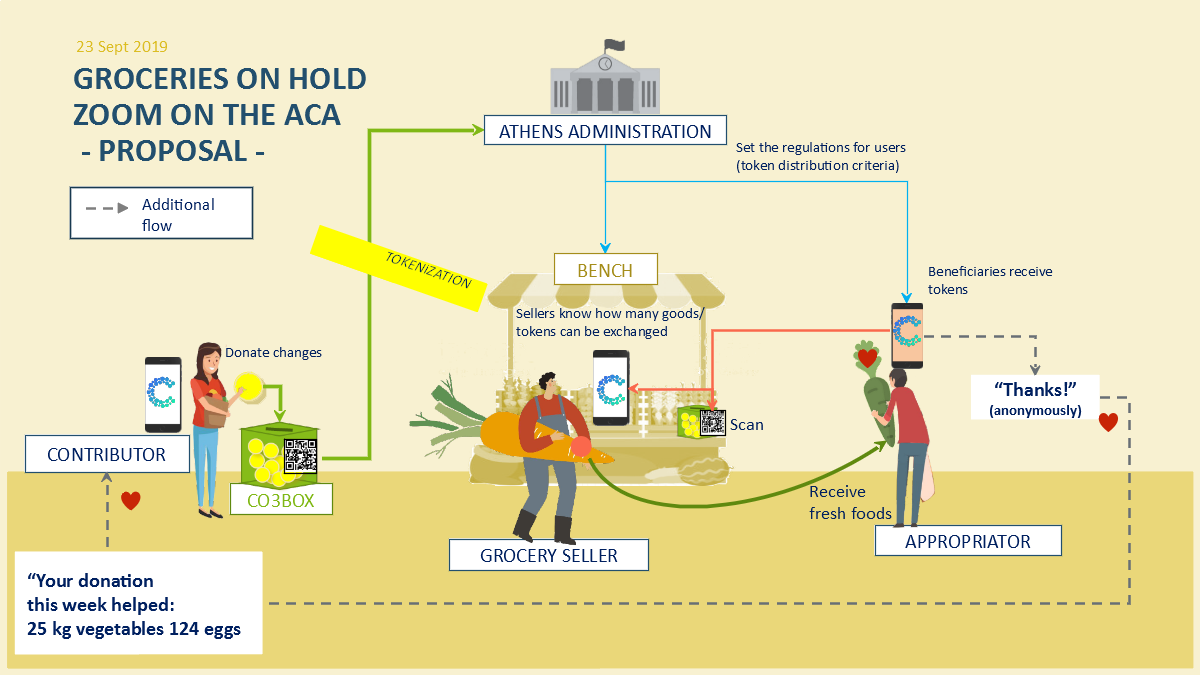At the end of last March, CO3project carried out the analysis on the lessons learned in the implementation of disruptive technologies. The following article is the first of three localized analytical summaries, beginning with the Athen’s case.
co3project: Lesssons learned from Athens pilot
The Athens pilot of the CO3 project consists of two main implementations under the social aspects application area’s prism. The first scenario refers to fresh food distribution and citizen donations with the main beneficiaries population in need. The second focuses on setting a ground for an open dialogue between citizens and the city on the aspect of empty buildings re-use and exploitation. More specifically, in the first scenario, the area of implementation are flea-markets organized in neighborhoods where citizens donate amounts that are tokenized. The tokens are consumed by beneficiaries that take as exchange fresh market products. In the second scenario, citizens map empty buildings in their locality and exploit the CO3 tools in order to geolocate them, propose potential uses and initiate public deliberation. As a final stage, open dialogue with city officials and administrators aims at elaborating on the feasibility of the proposed uses.
The Athens pilot in total includes all CO3 features for the implementation of the scenarios. The pilot is at the stage of end-users engagement and early implementation, hence more concrete outputs are expected in the next phase of the project.
The main lessons learned currently derived from the Athens pilot are:
- Citizens are open to explore new technologies proposed by the city and to adopt to new services and applications after proper introduction and walkthrough
- The usability and ease-of-use of new technologies is proportional to the level of their adoption both by the city and the citizens as end-users
- Local society is highly sensitive to matters referring to social policy and willing to explore new forms of co-management of relevant services that CO3 proposes.
- The integration of CO3 tools in one application is of upmost importance for the perception of the user and long-term engagement in the pilot activities.
- Technologies like AR that require specialized equipment, e.g. the latest versions of smartphones, are on one hand inviting to end-users due to its modern interface and features, but also not easy to diffuse in the society for economic reasons. However, CO3 has developed the feature for both Android and iOS in order to tackle the diffusion of the technology.

- Digital wallet features might receive hesitation from the end-user due to its connection with money-exchange. However, in flea-markets younger producers are more familiar and less hesitant than older age-groups
- End-users show high interest in co-creation processes and their results. Also, citizens engaging in the co-creation of services perceive the assets of their city as commons and thus the policies from such activities have wider impact in cities. The maintenance of policies is also expected.
- New policies that oppose established legal and accounting/economic constraints in Greece are more difficult to be implemented due to the procedures necessary for updating the relevant frameworks and proposing new ones. The latter procedures are an obstacle for legal and financial regulations to change or be renewed.
- The added value of CO3 framework is the interoperability with other tools, since in Athens pilot Coopboxes have been integrated for the 1st scenario.


